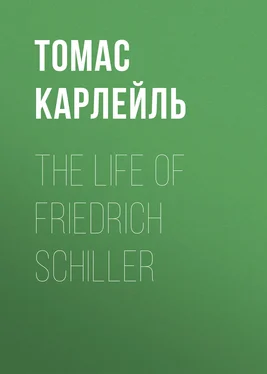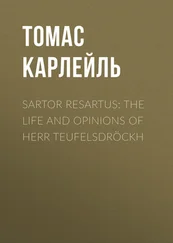Томас Карлейль - The Life of Friedrich Schiller
Здесь есть возможность читать онлайн «Томас Карлейль - The Life of Friedrich Schiller» — ознакомительный отрывок электронной книги совершенно бесплатно, а после прочтения отрывка купить полную версию. В некоторых случаях можно слушать аудио, скачать через торрент в формате fb2 и присутствует краткое содержание. Жанр: Биографии и Мемуары, Философия, foreign_edu, foreign_antique, на английском языке. Описание произведения, (предисловие) а так же отзывы посетителей доступны на портале библиотеки ЛибКат.
- Название:The Life of Friedrich Schiller
- Автор:
- Жанр:
- Год:неизвестен
- ISBN:нет данных
- Рейтинг книги:3 / 5. Голосов: 1
-
Избранное:Добавить в избранное
- Отзывы:
-
Ваша оценка:
- 60
- 1
- 2
- 3
- 4
- 5
The Life of Friedrich Schiller: краткое содержание, описание и аннотация
Предлагаем к чтению аннотацию, описание, краткое содержание или предисловие (зависит от того, что написал сам автор книги «The Life of Friedrich Schiller»). Если вы не нашли необходимую информацию о книге — напишите в комментариях, мы постараемся отыскать её.
The Life of Friedrich Schiller — читать онлайн ознакомительный отрывок
Ниже представлен текст книги, разбитый по страницам. Система сохранения места последней прочитанной страницы, позволяет с удобством читать онлайн бесплатно книгу «The Life of Friedrich Schiller», без необходимости каждый раз заново искать на чём Вы остановились. Поставьте закладку, и сможете в любой момент перейти на страницу, на которой закончили чтение.
Интервал:
Закладка:
Schiller was, in fact, growing tired of fictitious writing. Imagination was with him a strong, not an exclusive, perhaps not even a predominating faculty: in the sublimest flights of his genius, intellect is a quality as conspicuous as any other; we are frequently not more delighted with the grandeur of the drapery in which he clothes his thoughts, than with the grandeur of the thoughts themselves. To a mind so restless, the cultivation of all its powers was a peremptory want; in one so earnest, the love of truth was sure to be among its strongest passions. Even while revelling, with unworn ardour, in the dreamy scenes of the Imagination, he had often cast a longing look, and sometimes made a hurried inroad, into the calmer provinces of reason: but the first effervescence of youth was past, and now more than ever, the love of contemplating or painting things as they should be, began to yield to the love of knowing things as they are. The tendency of his mind was gradually changing; he was about to enter on a new field of enterprise, where new triumphs awaited him.
For a time he had hesitated what to choose; at length he began to think of History. As a leading object of pursuit, this promised him peculiar advantages. It was new to him; and fitted to employ some of his most valuable gifts. It was grounded on reality, for which, as we have said, his taste was now becoming stronger; its mighty revolutions and events, and the commanding characters that figure in it, would likewise present him with things great and moving, for which his taste had always been strong. As recording the past transactions, and indicating the prospects of nations, it could not fail to be delightful to one, for whom not only human nature was a matter of most fascinating speculation, but who looked on all mankind with the sentiments of a brother, feeling truly what he often said, that 'he had no dearer wish than to see every living mortal happy and contented with his lot.' To all these advantages another of a humbler sort was added, but which the nature of his situation forbade him to lose sight of. The study of History, while it afforded him a subject of continuous and regular exertion, would also afford him, what was even more essential, the necessary competence of income for which he felt reluctant any longer to depend on the resources of poetry, but which the produce of his pen was now the only means he had of realising.
For these reasons, he decided on commencing the business of historian. The composition of Don Carlos had already led him to investigate the state of Spain under Philip II.; and, being little satisfied with Watson's clear but shallow Work on that reign, he had turned to the original sources of information, the writings of Grotius, Strada, De Thou, and many others. Investigating these with his usual fidelity and eagerness, the Revolt of the Netherlands had, by degrees, become familiar to his thoughts; distinct in many parts where it was previously obscure; and attractive, as it naturally must be to a temper such as his. He now determined that his first historical performance should be a narrative of that event. He resolved to explore the minutest circumstance of its rise and progress; to arrange the materials he might collect, in a more philosophical order; to interweave with them the general opinions he had formed, or was forming, on many points of polity, and national or individual character; and, if possible, to animate the whole with that warm sympathy, which, in a lover of Freedom, this most glorious of her triumphs naturally called forth.
In the filling-up of such an outline, there was scope enough for diligence. But it was not in Schiller's nature to content himself with ordinary efforts; no sooner did a project take hold of his mind, than, rallying round it all his accomplishments and capabilities, he stretched it out into something so magnificent and comprehensive, that little less than a lifetime would have been sufficient to effect it. This History of the Revolt of the Netherlands, which formed his chief study, he looked upon but as one branch of the great subject he was yet destined to engage with. History at large, in all its bearings, was now his final aim; and his mind was continually occupied with plans for acquiring, improving, and diffusing the knowledge of it.
Конец ознакомительного фрагмента.
Текст предоставлен ООО «ЛитРес».
Прочитайте эту книгу целиком, купив полную легальную версию на ЛитРес.
Безопасно оплатить книгу можно банковской картой Visa, MasterCard, Maestro, со счета мобильного телефона, с платежного терминала, в салоне МТС или Связной, через PayPal, WebMoney, Яндекс.Деньги, QIWI Кошелек, бонусными картами или другим удобным Вам способом.
1
She was of humble descent and little education, the daughter of a baker in Kodweis.
2
His book is entitled Die Baumzucht im Grossen (the Cultivation of Trees on the Grand Scale): it came to a second edition in 1806.
3
The first display of his poetic gifts occurred also in his ninth year, but took its rise in a much humbler and less common source than the inspiration of the stage. His biographers have recorded this small event with a conscientious accuracy, second only to that of Boswell and Hawkins in regard to the Lichfield duck . 'The little tale,' says one of them, 'is worth relating; the rather that, after an interval of more than twenty years, Schiller himself, on meeting with his early comrade (the late Dr. Elwert of Kantstadt) for the first time since their boyhood, reminded him of the adventure, recounting the circumstances with great minuteness and glee. It is as follows: Once in 1768, Elwert and he had to repeat their catechism together on a certain day publicly in the church. Their teacher, an ill-conditioned, narrow-minded pietist, had previously threatened them with a thorough flogging if they missed even a single word. To make the matter worse, this very teacher chanced to be the person whose turn it was to catechise on the appointed day. Both the boys began their answers with dismayed hearts and faltering tongues; yet they succeeded in accomplishing the task; and were in consequence rewarded by the mollified pedagogue with two kreutzers apiece. Four kreutzers of ready cash was a sum of no common magnitude; how it should be disposed of formed a serious question for the parties interested. Schiller moved that they should go to Harteneck, a hamlet in the neighbourhood, and have a dish of curds-and-cream: his partner assented; but alas! in Harteneck no particle of curds or cream was to be had. Schiller then made offer for a quarter-cake of cheese; but for this four entire kreutzers were demanded, leaving nothing whatever in reserve for bread! Twice baffled, the little gastronomes, unsatisfied in stomach, wandered on to Neckarweihingen; where, at length, though not till after much inquiry, they did obtain a comfortable mess of curds-and-cream, served up in a gay platter, and silver spoons to eat it with. For all this, moreover, they were charged but three kreutzers; so that there was still one left to provide them with a bunch of St. John grapes. Exhilarated by such liberal cheer, Schiller rose into a glow of inspiration: having left the village, he mounted with his comrade to the adjacent height, which overlooks both Harteneck and Neckarweihingen; and there in a truly poetic effusion he pronounced his malediction on the creamless region, bestowing with the same solemnity his blessing on the one which had afforded him that savoury refreshment.' Friedrich von Schillers Leben (Heidelberg. 1817), p. 11.
Читать дальшеИнтервал:
Закладка:
Похожие книги на «The Life of Friedrich Schiller»
Представляем Вашему вниманию похожие книги на «The Life of Friedrich Schiller» списком для выбора. Мы отобрали схожую по названию и смыслу литературу в надежде предоставить читателям больше вариантов отыскать новые, интересные, ещё непрочитанные произведения.
Обсуждение, отзывы о книге «The Life of Friedrich Schiller» и просто собственные мнения читателей. Оставьте ваши комментарии, напишите, что Вы думаете о произведении, его смысле или главных героях. Укажите что конкретно понравилось, а что нет, и почему Вы так считаете.












